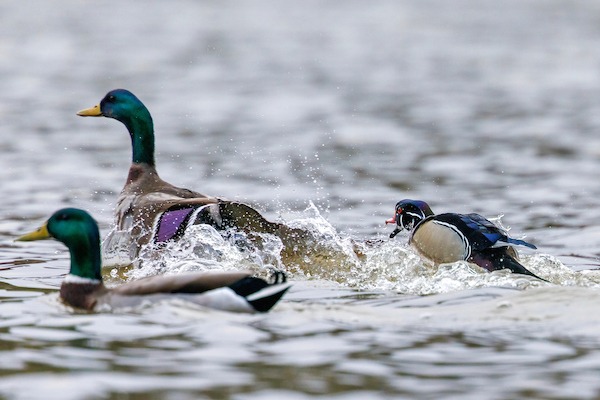Fall means hunting seasons, cooler air and an increase in new cases of the highly pathogenic avian influenza (HPAI).
The Wildlife Resources Commission said HPAI cases emerge due to the high numbers of migratory waterfowl that pass through or congregate in North Carolina. The Dept. of Agriculture also monitors HPAI, but the WRC focused primarily on HPAI in wildlife populations across the state, with an emphasis on birds.
“With the 2025-2026 migratory game bird seasons quickly approaching, we expect to encounter HPAI-infected bird species, especially waterfowl species,” said NCWRC Wildlife Health Biologist Miranda Turner.
New cases of avian influenza usually start in the fall and winter months, particularly along the Outer Banks and other coastal areas, Turner said.
“The Outer Banks area is an important wintering location for many waterfowl species due to its prime habitat,” said Turner. “The combination of good habitat and migratory activity causes an increase in waterfowl populations there, which creates an environment for the virus to easily spread between avian species.”
Influenza viruses are typically cold-hardy and are therefore able to proliferate more easily during the cold winter months. The birds most likely to be found with HPAI are waterfowl, shorebirds and raptors, although cases may less frequently occur in songbirds and wild mammal species.
As of the start of the 2025 fall migratory season, the NCWRC has confirmed HPAI in black vultures in Iredell County and is awaiting results from suspected cases in black vultures in Union County. Since the beginning of the current HPAI outbreak in early 2022, North Carolina has confirmed the virus in 413 wild birds and one black bear.
Symptoms of HPAI in wild birds may vary, including ocular and/or nasal discharge, coughing, difficulty breathing, diarrhea, lethargy, loss of coordination, walking or swimming in circles, head and neck twisting/wobbling, paralysis, swollen and/or discolored neck, head, and feet, and death.
The public can help reduce the spread of HPAI by following these suggestions:
- Do not approach any animals that appear sick or are behaving unusually.
- Do not allow pets to interact with any sick or dead animals.
- If a dead bird needs to be removed from a location where pets or people could come into contact with it:
- Use disposable gloves, a plastic bag or some other protective layer over your hands or use a shovel to pick up the animal and place it into a garbage bag. Consider wearing a face mask and eye protection if additional protection seems warranted.
- Double-bag the carcass before putting it in the trash.
- Wash your hands with soap and water after disposing of any animal carcass.
“The best way the public can help prevent the spread of HPAI is by removing food sources that encourage birds to congregate in one location, such as feeding ducks and geese or setting out bird feeders,” said Turner.
Currently there are no changes to any game bird seasons due to HPAI. Hunters are advised not to harvest or handle game birds that are obviously sick. Hunters should wear gloves when handling and dressing any harvested birds, and inedible parts should be buried where they were harvested or placed in a trash bag and disposed of in the trash. Wash hands and tools with soap and water or disinfectant wipes. Cook all game meat thoroughly prior to consumption.
To report dead wild animals suspected of contracting HPAI, especially six or more dead wild birds in one area within a period of one to two weeks, contact the N.C. Wildlife Helpline at 866-318-2401 (Monday-Friday, 8 a.m. to 5 p.m.) or email HWI@ncwildlife.gov.
Visit NCWRC’s Bird Diseases webpage for the most up-to-date information on HPAI in North Carolina.






